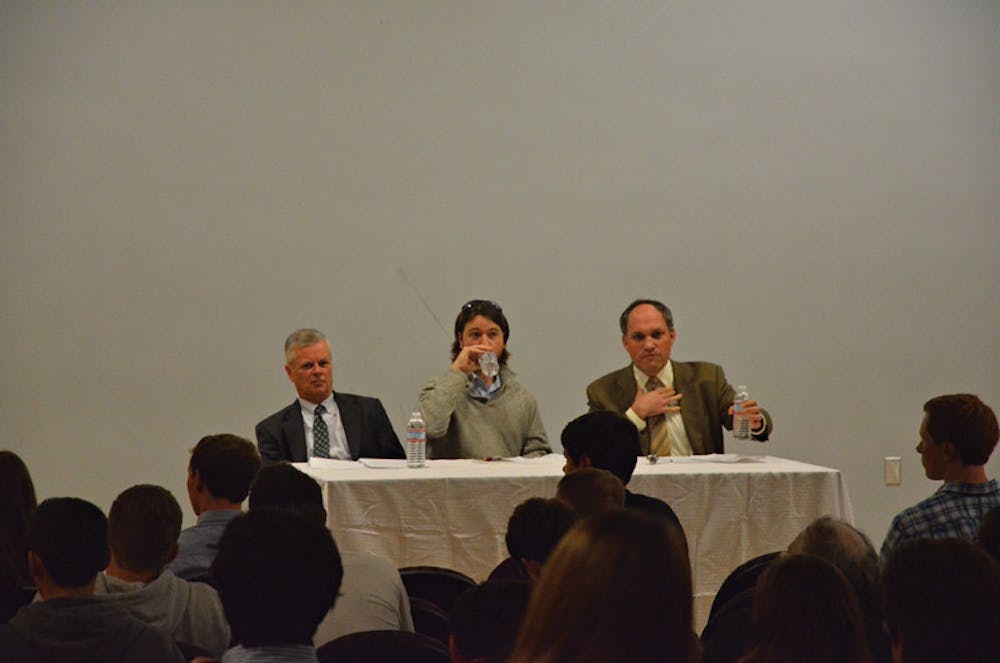Questions about the merits of intervention took center stage in a debate on United States foreign policy in the Middle East in a half-full List Art Center 120 Tuesday night.
The debate, entitled “America’s Role in the Middle East,” was sponsored by the Brown chapter of the Alexander Hamilton Society, a nonprofit group that organizes lectures on political topics. Middle East Studies Librarian Ian Straughn moderated the debate.
The U.S. government’s “desire to be a hegemon in the Middle East has not produced good results for the United States,” said Stephen Kinzer, visiting fellow at the Watson Institute for International Studies and a former foreign correspondent for the New York Times. Kinzer expressed his support for a reduced U.S. presence in the region, arguing that the nation’s current involvement has harmed the people of the Middle East.
Michael Rubin, a resident scholar at the right-leaning American Enterprise Institute and a former official at the U.S. Department of Defense, disagreed with Kinzer, highlighting what he said were the benefits of continued U.S. engagement in the Middle East. Rubin said a “power vacuum” would emerge if the United States withdrew its political influence from the region.
The speakers disagreed over whether U.S. foreign policy efforts in the Middle East has yielded benefits for local populations.
Kinzer said the United States’ involvement in the region has been motivated by its own political and economic interests, rather than by a genuine commitment to the interests of communities in the Middle East.
“I believe that the new order of the Middle East, whatever it is, should be based on the desires of the Middle East,” Kinzer said. “This order may not be open to American intervention. I think this is a fair price to pay.”
But Rubin argued that the United States has acted as a necessary stabilizer in the region, adding that the nation has addressed human rights concerns that he believes other major powers, such as Russia and China, might overlook.
Kinzer rebutted by saying a political shift would occur when the United States left the region, so the federal government should wind down its presence in the Middle East now rather than in the future. American citizens may not be committed to a long-lasting role in the Middle East, he added.
Both speakers criticized the process of U.S. developmental aid distribution in the Middle East.
U.S. aid to Middle Eastern countries in the form of financial assistance and economic development projects can often be detrimental, Kinzer said.
Rubin agreed — “Civilian aid is oftentimes undemocratic,” he said. “You are taking away the role of that government.”
Rubin cited cases where U.S. aid financed the building of roads in Afghanistan that local residents did not want.
Afghani military forces’ seizure of property from local landowners increased substantially following the U.S. road development projects, he said, adding these roads facilitated more land seizures.
Though Kinzer and Rubin agreed that some aid policies have been flawed, they had differing opinions on the effectiveness of the federal government’s efforts to transform the region into a collection of democracies.
Political restructuring efforts by U.S. policymakers have hurt developing states in the Middle East, Kinzer said.
“I believe we actually made Afghanistan less democratic by implementing parliamentary procedures,” he said.
The creation of a parliament has allowed warlords and drug dealers to exert a stronger influence on Afghanistan’s political process by winning seats in the legislature and supplanting local community leaders’ power, Kinzer said.
The United States must continue its political engagement in the region partly to combat terrorism, Rubin said. Terrorist threats in the Middle East stem from ideological agendas that will not subside if the United States withdraws from the area, he added.
Kinzer said he believed local grievances against the United States’ political involvement in the Middle East drive terrorist groups.
Both speakers voiced concern over the emergence of corruption in governments set up by the United States in the Middle East, but Rubin said he believed U.S. political involvement can help reduce that corruption.
“We are going to make mistakes,” Rubin said. “There is no magic formula in the region.”
But Kinzer expressed doubt about the United States’ ability to reduce the region’s political instability.
“The can-do attitude is quintessentially American,” Kinzer said. “But there are some challenges that even the can-do attitude can’t resolve.”
Some attendees said they approved of the speakers’ willingness to look beyond political ideology in discussing solutions to problems in the Middle East.
Matt Breuer ’14 said he was surprised by how Kinzer and Rubin were able to facilitate an open-minded discussion of complex challenges facing the region. He said Kinzer and Rubin transcended the divisive nature of the American political process in their presentations on foreign policy.

ADVERTISEMENT




